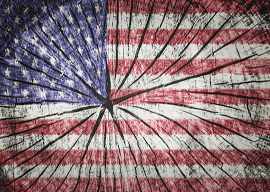
August 24, 2016

Source: Bigstock
Should America fall apart (God forfend!), Jonathan Haidt will be the doom merchant who rang the alarm bell the loudest.
The social psychologist just gave a remarkably prescient”and depressing”keynote speech on the state of our country heading into prime election season. Speaking before the American Psychological Association, Haidt dissected the cause behind political strife in America.
His diagnosis on our national health? Not good; maybe even terminal.
It’s more cliché than buntings on July 4th to say that we”re living in a politically divisive age. But facts are facts: The country is more polarized than ever. Haidt provides reams of data showing that half the nation looks at the other half with unbridled contempt. Not since the Civil War have voters, and their elected representatives, viewed their political rivals with such malice.
The Democrats, being the coalition of the fringes, are doubling down on their winning electoral strategy: Paint the other side as unrepentant bigots. For years, Republicans have failed to combat this with a coherent defense. The best counteroffensive they”ve come up with (until this year’s unexpected Trumpening) is conceding the moral high ground by co-opting the enemy’s tactics, i.e., screaming, “Democrats are the real racists!“
The two opposing stratagems leave voters, in Haidt’s words, with a “passionate intensity.” Democrats pump themselves full of self-righteousness. Republicans, characterized by their rivals as subhumans, are helpless against the media-enabled narrative, so they sit and stew in resentment. The embattled emotions make for a powder keg just a spark away from blowing.
Events reflect the growing discord among the citizenry. Haidt gives a laundry list of recent incidents that portend our declension: the 2013 government shutdown, Ferguson riots, police shootings in Dallas, terrorist attacks in Paris and Orlando, refugee crisis in Europe, populist uprisings like Brexit.
The coming apart is in no way exclusive to America or its political parties. All across the West, the liberal order is being challenged by an ugly truth: The world doesn”t share our affinity for a lawful and rational society. Ironically, it is the commoners who understand this more than the elites. As Peggy Noonan recently wrote in her perch at The Wall Street Journal, “I don”t have it fully right in my mind but something big is happening here with this division between the leaders and the led. It is very much a feature of our age.”
Haidt is worried about the divide, but doesn”t regard it as irreparable. Our differences in opinion don”t necessarily mean we must live in ideological separation. As a psychologist, Haidt understands how hidebound our moral dispositions are. “We are so good at finding reasons for whatever we want to believe or whatever our side believes. This is why you can”t argue someone out of their moral or political positions,” he says.
We may not change each other’s minds, but, Haidt maintains, we can still come together over common purpose and practice. Quoting authoritarianism expert Karen Stenner, he prescribes a cure for our diverging culture: “Ultimately, nothing inspires greater tolerance from the intolerant than an abundance of common and unifying beliefs, practices, rituals, institutions, and processes.”
If we can get past our differing views and rally around a shared set of values, the frayed threads of our society can be sewn up and we can become one again. Hillary Clinton has made this the theme of her campaign. Donald Trump echoed the togetherness message in a recent address where he encouraged listeners to “seek a new future built on our common culture and values as one American people.”